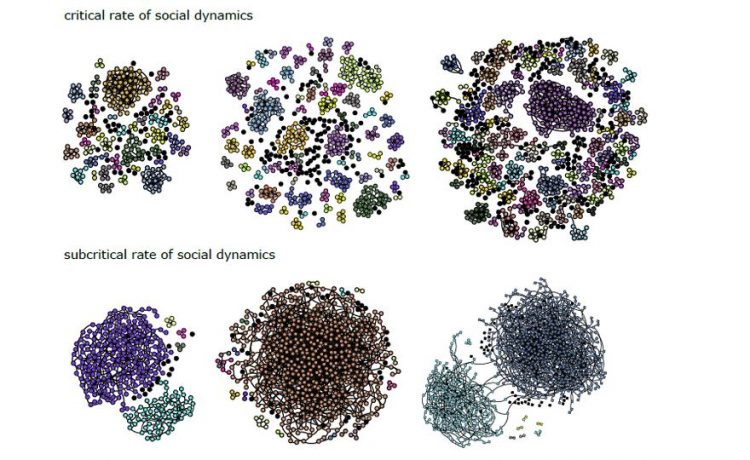How network dynamics shape collaboration

Full cooperation is most probable when the network adapts only slowly to new coalition structures. (Detail of Figure 2 in the study) Graphics: PIK
A team of researchers now used this approach to explore the development of large coalitions in a network of acquaintances, when cooperation promises the highest economic or social advantages. For the first time, they focused on how social relations interact with this process.
Published in the journal Scientific Reports of the renowned Nature group, their results show that full cooperation is most probable when the network adapts only slowly to new coalition structures. If the network adapts faster than new coalitions form, its fragmentation might prevent the formation of large-scale coalitions.
“Cooperation is critical when it comes to a common pool resource,” says lead author Sabine Auer of the Potsdam Institute for Climate Impact Research (PIK). Man-made climate change and the necessary transition to a low-carbon economy as one of the major current economic challenges are examples of changes which are closely related to several common pool resources like the atmosphere and renewable energy sources.
“As a more simple example, imagine a meadow used by several farmers – a common agreement on how to use this renewable resource in a sustainable way would be most profitable for the group at a whole in the long-term, so a trustworthy grand coalition would be the best option. However, our study shows that if some farmers quickly form a coalition before trust within the whole network is established, this might alienate the others – and the lost social tie may later prevent them to join the coalition,” Auer explains.
+++“Keep up good relations with your competitors so they might become your partners later”+++
Even though there clearly is a feedback loop of network structure influencing behavior and at the same time behavior influencing the network adaptation, so far the underlying social relations in a network were disregarded in models of coalition formation.
“Now we were able to investigate the role of trust and social relations for coalitions of multiple potential partners for the first time and found that full cooperation is most probable when the acquaintance network adapts only slowly to the coalition structure,” Auer says. “The relative speed of changes in social feedback loops seems to be crucial for transformation processes”.
“We provide a new methodological approach that can be used in socio-economic environments where cooperation promises economic or social advantages – this is an important step towards a better understanding of the mechanisms of collaboration,” says co-author Jobst Heitzig. It can be applied to study diverse subjects from firm size distribution to fish cohorts or political parties. “One common message is clear from the model: Keep up good relations with your competitors so they might become your partners later!”
+++Statistical physics used to study socio-economic systems+++
“Statistical physics provides a powerful means to conceptually study mechanisms of socio-economic systems and their associated transformations, such as market restructuring, social upheavals or even revolutions, says co-author Jürgen Kurths, chair of Research Domain Transdisciplinary Concepts & Methods” at the Potsdam Institute.
The study was carried out within the framework of PIK’s project “Copan – Coevolutionary Pathways,” that aims at developing conceptual models which consolidate natural and socio-economic subsystems of the Earth system and their relationship to each other. “The formation and breakdown of coalitions and the emergence of transitions is a major modelling challenge, which our study advanced to a new level of complexity,” says Kurths.
Article: Auer, S., Heitzig, J., Kornek, U., Schöll, E., Kurths, J. (2015): The Dynamics of Coalition Formation on Complex Networks. Nature Scientific Reports [DOI: 10.1038/srep13386]
Weblink to the article: www.nature.com/articles/srep13386
Media contact:
PIK press office
Phone: +49 331 288 25 07
E-Mail: press@pik-potsdam.de
Twitter: @PIK_Climate
Media Contact
More Information:
http://www.pik-potsdam.deAll latest news from the category: Social Sciences
This area deals with the latest developments in the field of empirical and theoretical research as it relates to the structure and function of institutes and systems, their social interdependence and how such systems interact with individual behavior processes.
innovations-report offers informative reports and articles related to the social sciences field including demographic developments, family and career issues, geriatric research, conflict research, generational studies and criminology research.
Newest articles

Silicon Carbide Innovation Alliance to drive industrial-scale semiconductor work
Known for its ability to withstand extreme environments and high voltages, silicon carbide (SiC) is a semiconducting material made up of silicon and carbon atoms arranged into crystals that is…

New SPECT/CT technique shows impressive biomarker identification
…offers increased access for prostate cancer patients. A novel SPECT/CT acquisition method can accurately detect radiopharmaceutical biodistribution in a convenient manner for prostate cancer patients, opening the door for more…

How 3D printers can give robots a soft touch
Soft skin coverings and touch sensors have emerged as a promising feature for robots that are both safer and more intuitive for human interaction, but they are expensive and difficult…





















